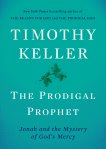If people know anything about the prophet Jonah, they know he was swallowed by a big fish. Consequently, because we live in an anti-miraculous age, people tend to dismiss Jonah’s story as just another fish story, the product of an ancient, credulous imagination. That dismissal is a shame, for the Book of Jonah tells a story with a timely message for people who live, as we do, in a moment of resurging nationalism.
The timeliness of that message is evident throughout The Prodigal Prophet by Timothy Keller. The book grew out of a series of expository sermons Keller preached at various times in his ministry. It reflects evangelicalism at its best: a biblical, Christ-centered, relevant call for conversion, not just in our spiritual lives, but in the totality of our lives.
We first meet Jonah in 2 Kings 14:25, which says that Jeroboam II, ruler of the northern kingdom of Israel, “restored the boundaries of Israel from Lebo Hamath to the Dead Sea, in accordance with the word of the LORD, the God of Israel, spoken through his servant Jonah son of Amittai, the prophet from Gath Hepher.” Although Jeroboam II “did evil in the eyes of the LORD” (verse 24), God kept covenant with His people (verses 26–27) and the territorial promises He had made to them. Jonah was the prophet of God’s promise-keeping.
Jeroboam II reigned from 792–751 B.C., a period during which the Assyrian Empire, which had earlier threatened Israel, had stagnated. After his death, however, it resurged and began to threaten Israel once again. In 722 B.C., it conquered Israel, brutalized its victims, and deported the population. Israel never recovered as a political entity. When we read the Book of Jonah, we need to keep the tension between Jonah’s prophecy of territorial expansion and the subsequent history of Israel’s destruction in mind, for it is key to understanding the book’s message.
It explains Jonah’s reluctance to take “the word of the Lord” (Jonah 1:1) to Nineveh, the capital city of Assyria. Though God instructed Jonah to “preach against” that “great city” (verse 2), Jonah knew that God’s judgment implicitly carried a promise of mercy to the repentant. “I knew that you were a gracious and compassionate God, slow to anger and abounding in love, a God who relents from sending calamity” (4:2). As a patriot, the prophet didn’t want to see good come to his nation’s enemies. But God did, and so He asks Jonah (verse 11): “should I not have concern for the great city of Nineveh, in which there are more than a hundred and twenty thousand people who cannot tell their right hand from their left?”
The tension between Jonah’s prophecy and Israel’s destruction also explains the book’s continuing relevance to us. The book ends without an answer from Jonah to God’s question. “The main purpose of God is to get Jonah to understand grace,” Keller writes. “The main purpose of the book of Jonah is to get us to understand grace.” Grace is God’s kindness and compassion to all people, not just our kindof people. Its ultimate embodiment was the incarnation of the Son of God, who died as the substitute for our sins and rose as the harbinger of our eternal life. When we understand this, it not only changes our hearts, but it changes the ways we relate to others. That is why God’s question at the end of Jonah is left unanswered. It is a question those who claim to follow God must answer anew in every generation.
The Prodigal Prophet makes for compelling reading. It explains the meaning of the Book of Jonah in its original context, but it draws out the implications of that meaning for our context. It shows the baleful ways Christians can worship ideological idols, misuse Scripture, and fail to love their neighbors as they should. But it also shows what a gospel-centered mission looks like, as well as how the gospel shapes our relationship with neighbors in our everyday lives. I’ll close this review with Keller’s penultimate paragraph, which itself ends with a question:
We live in a world fragmented into various “media bubbles,” in which you hear only news that confirms what you already believe. Anyone whose uses the internet and social media or who even watches most news channels today is being daily encouraged in a dozen ways to become like Jonah with regard to “those people over there.” Groups demonize and mock other groups. Each region of the country and political party finds reasons to despise the others. Christian believers today are being sucked into this maelstrom as much as, if not more than, anyone else. The Book of Jonah is a shot across the bow. God asks, how can we look at anyone — even those with deeply opposing beliefs and practices — with no compassion?
How you answer that question reveals what’s in your heart.
 Book Reviewed
Book Reviewed
Timothy Keller, The Prodigal Prophet: Jonah and the Mystery of God’s Mercy (New York: Viking, 2018).
P.S. If you found this review helpful, please click “Helpful” on my Amazon.com review page.
P.P.S. This review is cross-posted from InfluenceMagazine.com with permission.

